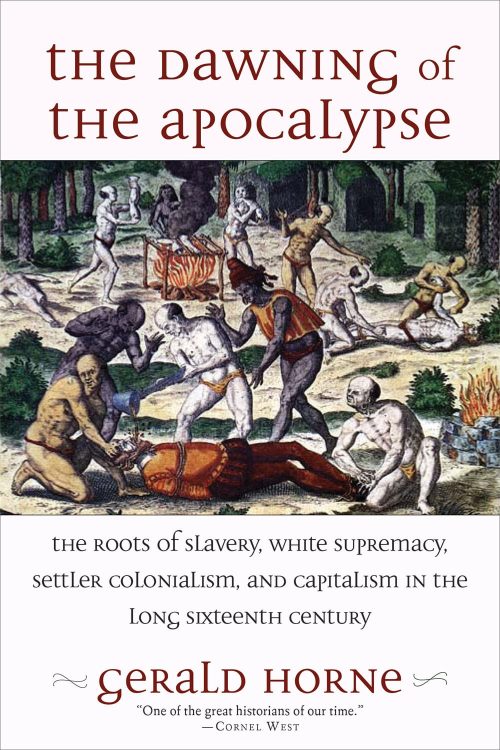The Dawning of the Apocalypse: The Roots of Slavery, White Supremacy, Settler Colonialism, and Capitalism in the Long Sixteenth Century
By Gerald Horne
303 pages, $27.00 paper, 978-1-58367-872-5
Reviewed by Sandy Plácido
The Dawning of the Apocalypse covers the rise of Spanish and then English settler colonialism in the Americas in the sixteenth and seventeenth centuries, while also offering relevant context on events dating back to the eleventh century throughout Europe, Africa, and Western Asia. One of Horne’s primary goals is to explain how England transformed from a peripheral and dysfunctional site into a major colonial power in the Americas beginning in the early 1600s. Horne argues that England took advantage of Spain’s decline in power throughout the 1500s, building upon the systems of slavery, settler colonialism, and early capitalism that the Spanish had established but adding to this structural cocktail a system of white supremacy that allowed England to unite groups that had previously warred in Europe due to religious differences. Thus, Horne traces key alliances that the English forged in their rise to power, such as the first recorded commercial treaty between England and Portugal in 1294. The English would eventually benefit from the leading role that Portugal took in Western Europe’s development of a slave trade in Africa before 1492, in response to the rise in power of Ottoman Turks in the east by 1453. As these power dynamics shifted in Europe, Spain turned to the Americas. Horne emphasizes that England eventually overtook Spain in this colonial project because “Madrid took religion too seriously, seemingly oblivious to the rising notion that settler colonialism required ‘race’ more than religion” (20). Horne explains how Spanish prioritization of religious affiliation led to a more flexible racial hierarchy that resulted in the existence of social groups such as armed, free African conquistadors.
Horne’s book is highly original in terms of its narration of intercolonial processes. Horne is able to both zoom into the important trends developed by the Spanish in what is now the Caribbean, Central and South America, and the US south and southwest, while simultaneously connecting events in the Americas with their causes and effects in Africa, Europe, and the Ottoman Empire. In addition to his geographic dexterity, Horne also uses 1492 as a fruitful departure point, expertly moving backward and forward in time from this infamous date to better contextualize global forces that developed in the long sixteenth century. One of the primary arguments in the book is also an original historical intervention. Horne’s focus on the role of religion in the development of white supremacy is an essential angle for understanding racial formation after 1492. Horne’s book is primarily a synthesis of information found in secondary sources, but it is a masterful blend of the interrelated events happening in Europe, Africa, West Asia, North, Central, and South America, and the Caribbean in the critical centuries before and after 1492.
Horne’s historical materialist method is what gives this book its breadth and depth, and allows him to see the connections between not only the machinations of the ruling elite, but also the resistance strategies of the exploited and racialized masses, in what is now New Mexico, Santo Domingo, Florida, Lisbon, Istanbul, and Guinea. The book is roughly chronological and propelled by an analysis of the shifting alliances, ideologies, and methods that produced the genocidal apocalypse of slavery, colonialism, and capitalism that have been so destructive for Black communities in the Americas and beyond.
As is consistent with his writing style, Horne elegantly unpacks the meanings of—and relationships between— events that are not often placed in conversation with each other, a reflection of a dialectical method that allows him to draw out the qualitative contours of vast amounts of historical information drawn from a wide range of geographies and time periods.
Horne certainly achieved his purpose of describing the historical factors that led to the development of interrelated systems of exploitation and control that strategically used white supremacy to consolidate a form of capitalist and settler colonial rule that began in the Caribbean, and over five hundred years later has been exported all over the world, with a particularly violent manifestation in the United States. The Dawning of the Apocalypse should be essential reading for those in the fields of American, Latin American, Caribbean, European, and African Studies, as well as students of political economy, colonialism, capitalism, and racial formation, among many others.

Comments are closed.